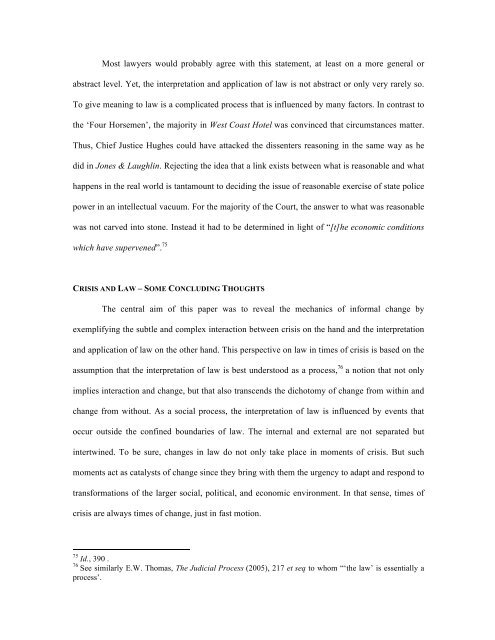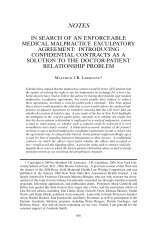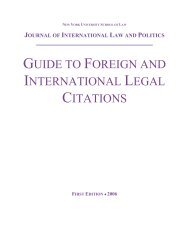Jasper Finke, Crisis and Law - New York University School of Law
Jasper Finke, Crisis and Law - New York University School of Law
Jasper Finke, Crisis and Law - New York University School of Law
You also want an ePaper? Increase the reach of your titles
YUMPU automatically turns print PDFs into web optimized ePapers that Google loves.
Most lawyers would probably agree with this statement, at least on a more general or<br />
abstract level. Yet, the interpretation <strong>and</strong> application <strong>of</strong> law is not abstract or only very rarely so.<br />
To give meaning to law is a complicated process that is influenced by many factors. In contrast to<br />
the ‘Four Horsemen’, the majority in West Coast Hotel was convinced that circumstances matter.<br />
Thus, Chief Justice Hughes could have attacked the dissenters reasoning in the same way as he<br />
did in Jones & Laughlin. Rejecting the idea that a link exists between what is reasonable <strong>and</strong> what<br />
happens in the real world is tantamount to deciding the issue <strong>of</strong> reasonable exercise <strong>of</strong> state police<br />
power in an intellectual vacuum. For the majority <strong>of</strong> the Court, the answer to what was reasonable<br />
was not carved into stone. Instead it had to be determined in light <strong>of</strong> “[t]he economic conditions<br />
which have supervened”. 75<br />
CRISIS AND LAW – SOME CONCLUDING THOUGHTS<br />
The central aim <strong>of</strong> this paper was to reveal the mechanics <strong>of</strong> informal change by<br />
exemplifying the subtle <strong>and</strong> complex interaction between crisis on the h<strong>and</strong> <strong>and</strong> the interpretation<br />
<strong>and</strong> application <strong>of</strong> law on the other h<strong>and</strong>. This perspective on law in times <strong>of</strong> crisis is based on the<br />
assumption that the interpretation <strong>of</strong> law is best understood as a process, 76 a notion that not only<br />
implies interaction <strong>and</strong> change, but that also transcends the dichotomy <strong>of</strong> change from within <strong>and</strong><br />
change from without. As a social process, the interpretation <strong>of</strong> law is influenced by events that<br />
occur outside the confined boundaries <strong>of</strong> law. The internal <strong>and</strong> external are not separated but<br />
intertwined. To be sure, changes in law do not only take place in moments <strong>of</strong> crisis. But such<br />
moments act as catalysts <strong>of</strong> change since they bring with them the urgency to adapt <strong>and</strong> respond to<br />
transformations <strong>of</strong> the larger social, political, <strong>and</strong> economic environment. In that sense, times <strong>of</strong><br />
crisis are always times <strong>of</strong> change, just in fast motion.<br />
75 Id., 390 .<br />
76 See similarly E.W. Thomas, The Judicial Process (2005), 217 et seq to whom “‘the law’ is essentially a<br />
process’.
















